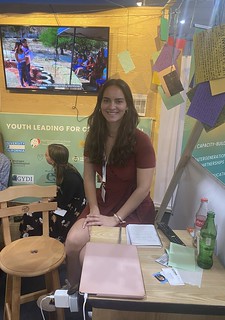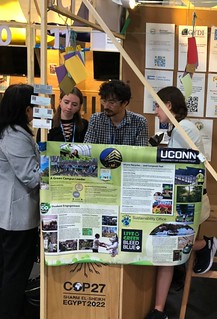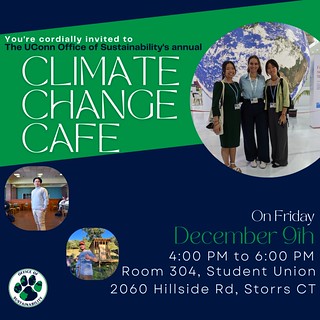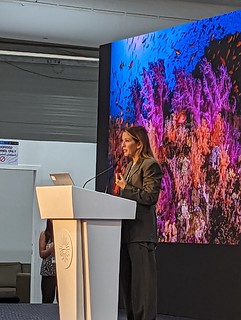Located in Egypt, people referred to COP27 as the “African COP” with the hope for a focus on equity and supporting developing countries who will be disproportionately impacted by the climate crisis.
Let’s look at what we achieved during COP this year and what remains undone.
COP27 achieved the first ever “Loss and Damage” Fund in history. Big developed nations, like the US and those in the European Union, are major contributors to the climate crisis as they have released the largest amounts of greenhouse gasses. Thus, G77 members, which is a coalition of developing countries, amplify that those most responsible for emissions should pay for the cost of damage for nations most affected by climate impacts. However, who will pay into this fund, how much, and which countries will benefit was not established and pushed off until COP28. On a positive note, agreements confirmed to operationalize the “Santiago Network”, which is a platform that connects developing countries to technical assistance and resources to address loss and damage.
Developed countries previously committed to providing US$100 billion by 2020 to developing countries to finance mitigation projects, to reduce nations’ greenhouse gas emissions, and adaptation projects, to build more resilient infrastructure to climate impacts. However, this goal was not meet with countries only providing US$83.3 billion in 2020. COP27 had plans to double the adaptation finance; however, no new goals were developed, and the commitment for doubling adaptation finance was pushed till 2025. Additionally, studies have shown that developing countries actually need US$1 trillion in 2030 to support external finance – far off from current commitments.
COP27 failed to get a commitment from all parties to phase out fossil fuels – the main cause of global warming. Vague language was included instead to “[accelerate] efforts towards the phase-down of unabated coal power and phase-out of inefficient fossil fuel subsidies”. This is included in the Sharm el-Sheik Implementation Plan which summarizes the main decisions determined during party negotiations. The words “unabated” and “inefficient” allow for interpretation and loopholes that continue the use of these high carbon-emitting resources.
Many firsts did occur at COP27. Negotiators acknowledged that the “transformation of financial systems and its structure and processes” is necessary to deliver climate finance – which recognizes the current inadequacies of capitalism to address climate change. Language about human rights, such as the right to clean, health, and sustainable environment, was written in the final COP text. The importance of nature-based solutions and ocean-based action was recognized. More holistics approaches to agriculture that include food systems, food security, nutrition, role of Indigenous peoples, women, and small-scale farmers was recognized through a 4-year work programme. The first-ever youth envoy was adopted at COP27 to highlight the need for children and youth representation in decision-making! The first work program on Just Transitions was established to build workforce development opportunities for communities in need – a major demand with indigenous, labor, youth, women and gender, and disability justice advocates
The honesty and power of climate justice leaders keeps me sustained and empowered in this movement. While this is a global issue, the solutions are local – and we need to listen to frontline communities and support community-based work. Transformative action to keep global temperatures below 1.5 degree Celsius continues to stall due to interests of big fossil fuel companies. We need to hold our leaders accountable to supporting the well-being of people and recognize the power we have to enact change.
Over the next 7 years, we need a rapid deployment of clean energy technology to achieve the United States emissions reductions of 45% by 2030. I want to be a part of work programs that center Just Transitions and create job opportunities for low-income communities and communities of color. I call on all students at UConn to imagine, believe, and become the future you want to see. We cannot let the 1.5 degree Celsius goal slip. Start to envision how you can align your personal, academic, and career goals with climate action, and join us in community as we transform our culture to a more just, clean place.
Sources:
- https://www.unep.org/news-and-stories/story/cop27-ends-announcement-historic-loss-and-damage-fund
- https://www.escr-net.org/news/2022/cop-27-delivers-progress-loss-and-damage-fails-fossil-fuels
- https://unfccc.int/process-and-meetings/the-paris-agreement/the-glasgow-climate-pact/cop26-outcomes-finance-for-climate-adaptation#developed-countries-have-pledged-usd-100-billion-annually-to-developing-countries.-how-much-of-this-is-destined-to-go-towards-adaptation?-
- https://www.oecd-ilibrary.org/docserver/d28f963c-en.pdf?expires=1669824599&id=id&accname=guest&checksum=F66741C6CA5F8EFA514700BB75E45393
- https://www.reuters.com/business/cop/cop-27-developing-countries-need-1-trillion-year-climate-finance-report-2022-11-08/#:~:text=%22The%20world%20needs%20a%20breakthrough,summit%20hosts%2C%20Egypt%20and%20Britain.
- https://unfccc.int/sites/default/files/resource/cop27_auv_2_cover%20decision.pdf
https://twitter.com/arthurwyns/status/1594301617947418626?s=48&t=PFfKSTOHIxL1nSn-yotpPQ

 After my initial frustrations about not being able to contribute to international agreements, I realized change does not have to come about in such extravagant gestures. While the COP was a place for parties to meet internationally, it was also a place to share smaller successes that can be duplicated throughout local communities. I witnessed how youth were being involved in various spheres which made the problem of climate change not seem so daunting. Throughout my time at UConn I have been so focused on policy as the way to solve the climate crisis. What COP has put into perspective for me is that policy may be written and implemented by policy makers, but it is the attitude of the people that shape it. One way to shift such attitudes and accelerate the inclusion of new perspectives is through youth involvement and education. When kids can grow up learning about, experiencing and understanding our planet there is greater room for change. I always told myself I wouldn’t go into education. But I have since seen how influential my role in educating generations even beyond mine could be. Climate change is a crisis that my generation has inherited from generations before mine that did not deal with it. It is inevitable that the generations that come after mine will inherit the crisis however we choose to deal with it (or not). Climate change most likely won’t be solved in the next 30 years and even if it is, the Earth needs time to heal. One thing I hope I can do is leave the next generation with the adequate tools to continue on the work my peers and I are doing today. While this isn’t a path for myself that I have explored indepth, my time at COP has contributed to this new avenue.
After my initial frustrations about not being able to contribute to international agreements, I realized change does not have to come about in such extravagant gestures. While the COP was a place for parties to meet internationally, it was also a place to share smaller successes that can be duplicated throughout local communities. I witnessed how youth were being involved in various spheres which made the problem of climate change not seem so daunting. Throughout my time at UConn I have been so focused on policy as the way to solve the climate crisis. What COP has put into perspective for me is that policy may be written and implemented by policy makers, but it is the attitude of the people that shape it. One way to shift such attitudes and accelerate the inclusion of new perspectives is through youth involvement and education. When kids can grow up learning about, experiencing and understanding our planet there is greater room for change. I always told myself I wouldn’t go into education. But I have since seen how influential my role in educating generations even beyond mine could be. Climate change is a crisis that my generation has inherited from generations before mine that did not deal with it. It is inevitable that the generations that come after mine will inherit the crisis however we choose to deal with it (or not). Climate change most likely won’t be solved in the next 30 years and even if it is, the Earth needs time to heal. One thing I hope I can do is leave the next generation with the adequate tools to continue on the work my peers and I are doing today. While this isn’t a path for myself that I have explored indepth, my time at COP has contributed to this new avenue. COP27 was one of the most meaningful weeks of my life. Full of dynamic challenges, I feel my worldview of climate change vastly evolved and broadened. COP27’s goals were to implement policies on adaptation and mitigation and loss and damages: two concepts I only tangentially worked with. I realized the importance of these missions when I heard this quote at the Ocean Alliance pavilion: “conservation without funding is just conversation.” Spending so much of my time at UConn connecting with the land, I feel I dismissed the financial aspect of climate change. It seemed unimportant when I could listen to the trees and the animals. But hearing the cries from people for the implementation of loss and damages, awakened me to the importance of finance. I attended a panel discussing financial changes since the adoption of the Glasgow Pledge during COP26. It was a contrasting panel: people from the global south passionately and desperately asking for progress at this COP and people from the global north indifferently talking about frivolous roadblocks to reparations and justice. So distributing that funding is immensely important to conservation work. Without that action, we are simply engaging in tedious conversations that don’t further climate policy whatsoever. COP27 opened my world to a whole new sector of sustainability.
COP27 was one of the most meaningful weeks of my life. Full of dynamic challenges, I feel my worldview of climate change vastly evolved and broadened. COP27’s goals were to implement policies on adaptation and mitigation and loss and damages: two concepts I only tangentially worked with. I realized the importance of these missions when I heard this quote at the Ocean Alliance pavilion: “conservation without funding is just conversation.” Spending so much of my time at UConn connecting with the land, I feel I dismissed the financial aspect of climate change. It seemed unimportant when I could listen to the trees and the animals. But hearing the cries from people for the implementation of loss and damages, awakened me to the importance of finance. I attended a panel discussing financial changes since the adoption of the Glasgow Pledge during COP26. It was a contrasting panel: people from the global south passionately and desperately asking for progress at this COP and people from the global north indifferently talking about frivolous roadblocks to reparations and justice. So distributing that funding is immensely important to conservation work. Without that action, we are simply engaging in tedious conversations that don’t further climate policy whatsoever. COP27 opened my world to a whole new sector of sustainability. My time in Sharm El-Sheikh was a display of the progress made in the fight for climate justice, but a sobering reality of how much further we have to go. I came to the conference with a desire to see ardent talks making monumental progress, but I was faced with stolid negotiations focused on the minutiae rather than tangible, large-scale solutions. Everytime I sought progress, I was met with compromise. Perhaps the zenith of COP27 was the announcement of a “Loss and Damage” fund intended to assist those countries most affected by climate change. Yet, there is no clear indication of who will pay into the fund, where the money will come from, or who will benefit.
My time in Sharm El-Sheikh was a display of the progress made in the fight for climate justice, but a sobering reality of how much further we have to go. I came to the conference with a desire to see ardent talks making monumental progress, but I was faced with stolid negotiations focused on the minutiae rather than tangible, large-scale solutions. Everytime I sought progress, I was met with compromise. Perhaps the zenith of COP27 was the announcement of a “Loss and Damage” fund intended to assist those countries most affected by climate change. Yet, there is no clear indication of who will pay into the fund, where the money will come from, or who will benefit.
 Sharm-el-Sheikh, the location of COP27, is a coastal Egyptian resort town that is adjacent to the Great Fringing Reef. Located in the cooler waters of the Red Sea, this reef is one of the most resilient reefs in the world; it is no surprise that COP27 publicity and advertisements repeatedly featured images and videos of the beautiful and vibrant underwater world. On one panel, “Hope For Coral Reefs,” singer-songwriter Ellie Goulding praised the reef’s “sheer visual beauty” and encouraged the audience to “please experience this reef yourself.” Yet at a conference where activisists and negotiators are working long days– and sometimes overnight– there seemed to be little time left to enjoy the beauty of nature.
Sharm-el-Sheikh, the location of COP27, is a coastal Egyptian resort town that is adjacent to the Great Fringing Reef. Located in the cooler waters of the Red Sea, this reef is one of the most resilient reefs in the world; it is no surprise that COP27 publicity and advertisements repeatedly featured images and videos of the beautiful and vibrant underwater world. On one panel, “Hope For Coral Reefs,” singer-songwriter Ellie Goulding praised the reef’s “sheer visual beauty” and encouraged the audience to “please experience this reef yourself.” Yet at a conference where activisists and negotiators are working long days– and sometimes overnight– there seemed to be little time left to enjoy the beauty of nature. At the same time, it is important to recognize the privilege and responsibility that comes with being able to attend COP27. Very few people have the opportunity to travel to the conference, and it is especially rare to be able to do so as a student. To have spent a week in a hotel along the coast of the Red Sea was amazing, with that luxury in juxtaposition with many of the stories told by activists from communities where significant impacts from climate change are already being felt. However, I also believe that the coming together of activists, politicians, negotiators, citizens, and indigenous peoples from around the world in one place is invaluable, and that finding joy in the world around us is necessary to sustaining activism. Particularly as frustratingly little progress was made on reaching a 1.5 degree warming target, it is important to take time to reset for the continued fight for a more equitable and sustainable future.
At the same time, it is important to recognize the privilege and responsibility that comes with being able to attend COP27. Very few people have the opportunity to travel to the conference, and it is especially rare to be able to do so as a student. To have spent a week in a hotel along the coast of the Red Sea was amazing, with that luxury in juxtaposition with many of the stories told by activists from communities where significant impacts from climate change are already being felt. However, I also believe that the coming together of activists, politicians, negotiators, citizens, and indigenous peoples from around the world in one place is invaluable, and that finding joy in the world around us is necessary to sustaining activism. Particularly as frustratingly little progress was made on reaching a 1.5 degree warming target, it is important to take time to reset for the continued fight for a more equitable and sustainable future. Winning a monumental court case should feel incredible, right? The opposite was true for Luisa Neubauer, the plaintiff in
Winning a monumental court case should feel incredible, right? The opposite was true for Luisa Neubauer, the plaintiff in